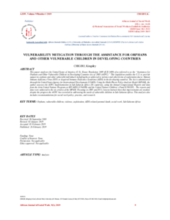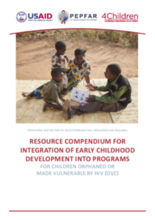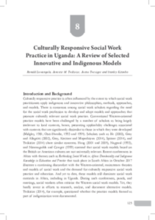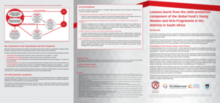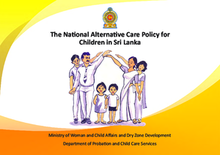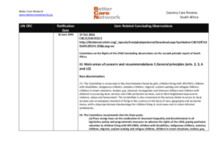Displaying 31 - 40 of 412
This paper analyzes the United States of America (U.S). House Resolution 1409 (H.R.1409) also referred to as the “Assistance for Orphans and Other Vulnerable Children in Developing Countries Act of 2005 (AOVC).”
This study explored children orphaned by AIDS perceptions and experiences of HIV-related stigma and how it has affected their psychosocial well-being.
In the current study, data were collected from 184 youth at drop-in centers in Los Angeles using behavioral health questionnaires to explore the relationships between specific aspects of foster care experiences and engagement in HIV-risk behaviors.
This study used magnetic resonance imaging to compare adolescent AIDS orphans reared in institutions with a sex- and age-matched group of healthy adolescents reared in families in China using a voxel-based morphometry analysis.
Written for USAID and PEPFAR implementing partners, with a focus on OVC practitioners, this is a user-friendly compendium of current resources, information and job aids for early childhood care, stimulation and education.
This chapter from Social Work Practice in Africa: Indigenous and Innovative Approaches showcases examples of home-grown indigenous and innovative models of social work practice in Uganda, including local models for addressing the HIV/AIDS orphan crisis in Rakai district.
This briefing paper reports on the lessons learnt from a process evaluation of the child protection component of the Global Fund’s Young Women and Girls (YWG) programme, a multi-pronged HIV prevention programme targeting young women and girls implemented in 10 districts in South Africa.
Sri Lanka's National Policy on the Alternative Care of Children outlines a comprehensive range of alternative care options and encourages the reforming of all formal structures that provide at-home and out-of-home services for children deprived of care and protection or at risk of being so. This policy also extends to children under care of the Juvenile Justice System. It provides policy solutions to programming for children at risk of family separation and facing deprivations such as child abuse, neglect, child labor, poverty, addiction, imprisonment, human trafficking, mental and physical disabilities, HIV/AIDS, domestic violence, orphanhood, abandonment and displacement etc. The policy also takes into consideration and encompasses provisions to children who are forced to live and work on streets.
The aim of this study from Primary Health Care Research & Development was to examine the effects and gender dimensions of providing voluntary, community-based, care-related labour for children affected by AIDS.
This country care review includes the care-related Concluding Observations adopted by the Committee on the Rights of the Child and the Committee on the Rights of Persons with Disabilities.

